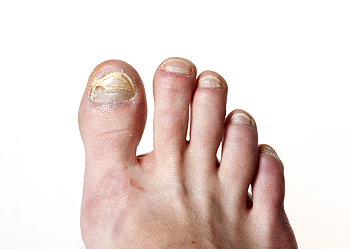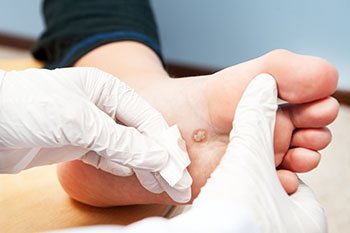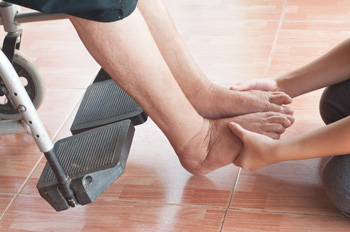Items filtered by date: December 2021
Risk Factors and Treatment of Plantar Warts
Plantar warts are unsightly and can be painful. These small, hardened growths that form on the bottom of the foot are typically benign, but highly contagious. The Human Papilloma Virus (HPV), which is usually the primary cause, enters the body through a sore or crack in the skin. It generally affects the heels and the fleshy area at the base of the toes. The virus is found in moist places like communal pools, public showers, and gym locker rooms. It’s recommended to wear protective foot coverings in such areas to help prevent contact with the virus. It’s also important to avoid touching the warts, as the virus can be easily spread. Treatment options include over-the-counter medications, liquid nitrogen, which burns the callus off the foot, or cryotherapy which freezes the wart. If plantar warts are a recurring problem, it is strongly suggested to visit a podiatrist for a proper diagnosis and treatment plan.
Plantar warts can be very uncomfortable. If you need your feet checked, contact the foot specialists from Podiatry Associates of Belleville. Our doctors will assist you with all of your foot and ankle needs.
About Plantar Warts
Plantar warts are the result of HPV, or human papillomavirus, getting into open wounds on the feet. They are mostly found on the heels or balls of the feet.
While plantar warts are generally harmless, those experiencing excessive pain or those suffering from diabetes or a compromised immune system require immediate medical care. Plantar warts are easily diagnosed, usually through scraping off a bit of rough skin or by getting a biopsy.
Symptoms
- Lesions on the bottom of your feet, usually rough and grainy
- Hard or thick callused spots
- Wart seeds, which are small clotted blood vessels that look like little black spots
- Pain, discomfort, or tenderness of your feet when walking or standing
Treatment
- Freezing
- Electric tool removal
- Laser Treatment
- Topical Creams (prescription only)
- Over-the-counter medications
To help prevent developing plantar warts, avoid walking barefoot over abrasive surfaces that can cause cuts or wounds for HPV to get into. Avoiding direct contact with other warts, as well as not picking or rubbing existing warts, can help prevent the further spread of plantar warts. However, if you think you have developed plantar warts, speak to your podiatrist. He or she can diagnose the warts on your feet and recommend the appropriate treatment options.
If you have any questions please feel free to contact our office located in Belleville, NJ . We offer the newest diagnostic and treatment technologies for all your foot and ankle needs.
Underlying Issues That May Cause Heel Pain
A variety of underlying issues can cause heel pain, including bone disorders, soft tissue problems, and systemic diseases. Plantar fasciitis is the most common cause of heel pain. This occurs when the plantar fascia, the long band of fibrous tissue on the sole of the feet, gets damaged, torn, or inflamed. Other soft tissue disorders which may lead to heel pain include Achilles tendonitis (an inflammation of the tendon which connects the calf muscles to the heel bone) and bursitis (an inflammation of the bursa sac that protects the Achilles tendon at the back of the heel). Bone issues that can cause heel pain include traumatic injuries or stress fractures of the heel bone, osteomyelitis (bone infection), osteoporosis (bone disease), and heel spurs—which are hardened calcium deposits that build up on the heel bone due to repeated stress. Certain systemic diseases can also present heel pain, such as rheumatoid arthritis (inflammatory joint disease) and peripheral neuropathy (nerve damage). If you have any type of heel pain, it is suggested that you make an appointment with a podiatrist who can diagnose the origin of your heel pain through a physical examination, diagnostic imaging and other evaluations, and treat your condition accordingly.
Many people suffer from bouts of heel pain. For more information, contact the foot specialists of Podiatry Associates of Belleville. Our doctors can provide the care you need to keep you pain-free and on your feet.
Causes of Heel Pain
Heel pain is often associated with plantar fasciitis. The plantar fascia is a band of tissues that extends along the bottom of the foot. A rip or tear in this ligament can cause inflammation of the tissue.
Achilles tendonitis is another cause of heel pain. Inflammation of the Achilles tendon will cause pain from fractures and muscle tearing. Lack of flexibility is also another symptom.
Heel spurs are another cause of pain. When the tissues of the plantar fascia undergo a great deal of stress, it can lead to ligament separation from the heel bone, causing heel spurs.
Why Might Heel Pain Occur?
- Wearing ill-fitting shoes
- Wearing non-supportive shoes
- Weight change
- Excessive running
Treatments
Heel pain should be treated as soon as possible for immediate results. Keeping your feet in a stress-free environment will help. If you suffer from Achilles tendonitis or plantar fasciitis, applying ice will reduce the swelling. Stretching before an exercise like running will help the muscles. Using all these tips will help make heel pain a condition of the past.
If you have any questions please contact our office located in Belleville, NJ . We offer the newest diagnostic and treatment technologies for all your foot and ankle needs.
How to Recognize a Fungal Infection of the Toes
 If your toenails are discolored, thickened, smell bad, or look deformed, you may have developed a fungal infection. This condition affects about 10 percent of the general population, but it is far more prevalent in seniors, especially those who are 70 or older. This is because nails become drier and more brittle as we age. Poor circulation and a weakened immune system can also be contributing factors. In addition, if you have injured a nail or have diabetes or psoriasis, you may have an increased risk for developing a fungal infection. It is possible to catch a fungal infection through contact with another person, or even from your own body. Sometimes Athlete’s foot, another common fungal infection usually found between the toes, can spread to the toenails as well. If you notice that your toenails are brittle, crumbling, or ragged, it is wise to schedule an appointment with a podiatrist to receive proper treatment and to prevent the fungus from spreading further.
If your toenails are discolored, thickened, smell bad, or look deformed, you may have developed a fungal infection. This condition affects about 10 percent of the general population, but it is far more prevalent in seniors, especially those who are 70 or older. This is because nails become drier and more brittle as we age. Poor circulation and a weakened immune system can also be contributing factors. In addition, if you have injured a nail or have diabetes or psoriasis, you may have an increased risk for developing a fungal infection. It is possible to catch a fungal infection through contact with another person, or even from your own body. Sometimes Athlete’s foot, another common fungal infection usually found between the toes, can spread to the toenails as well. If you notice that your toenails are brittle, crumbling, or ragged, it is wise to schedule an appointment with a podiatrist to receive proper treatment and to prevent the fungus from spreading further.
If left untreated, toenail fungus may spread to other toenails, skin, or even fingernails. If you suspect you have toenail fungus it is important to seek treatment right away. For more information about treatment, contact the foot specialists of Podiatry Associates of Belleville. Our doctors can provide the care you need to keep you pain-free and on your feet.
Symptoms
- Warped or oddly shaped nails
- Yellowish nails
- Loose/separated nail
- Buildup of bits and pieces of nail fragments under the nail
- Brittle, broken, thickened nail
Treatment
If self-care strategies and over-the-counter medications does not help your fungus, your podiatrist may give you a prescription drug instead. Even if you find relief from your toenail fungus symptoms, you may experience a repeat infection in the future.
Prevention
In order to prevent getting toenail fungus in the future, you should always make sure to wash your feet with soap and water. After washing, it is important to dry your feet thoroughly especially in between the toes. When trimming your toenails, be sure to trim straight across instead of in a rounded shape. It is crucial not to cover up discolored nails with nail polish because that will prevent your nail from being able to “breathe”.
In some cases, surgical procedure may be needed to remove the toenail fungus. Consult with your podiatrist about the best treatment options for your case of toenail fungus.
If you have any questions, please feel free to contact our office located in Belleville, NJ . We offer the newest diagnostic and treatment technologies for all your foot care needs.
Wounds That Don't Heal Need to Be Checked
Who Is Most at Risk for Age-Related Foot Problems?
Aging is a natural risk factor for many foot problems, including bunions, corns, calluses, hammertoes, ingrown toenails, fungal infections, diabetic foot problems, arthritis, heel pain, tarsal tunnel syndrome, and more. This is because as you age, your feet tend to spread and lose the fatty padding that cushions them. People with certain underlying medical conditions such as diabetes, arthritis, neuropathy, and congenital foot deformities may be more likely to develop foot problems. Specific lifestyle factors like wearing ill-fitting shoes, standing for prolonged periods of time, walking on hard surfaces, and being overweight can all contribute to the risk of foot problems. While medical risk factors are often outside of one’s control, lifestyle factors can usually be modified to prevent potential foot issues. For more information about aging and foot health, it is suggested that you consult with a podiatrist.
If you need your feet checked, contact the foot specialists of Podiatry Associates of Belleville. Our doctors will attend to all of your foot and ankle needs and provide you with quality treatment.
Geriatrics and Podiatry
When people age, some common issues that may occur are bone density loss, dry skin, poor circulation, and rough brittle nails. These issues may also affect your foot health if the necessary steps are not taken to alleviate the problems.
It is important to take care of your feet because feet that are injured or diseased can affect your overall health. Having painful feet hinders your ability to do daily activities or may decrease your willingness to do the things that you need to do.
Visiting Your Geriatrician
As we age, health problems become more likely, so it is essential to visit your doctor for check-ups to ensure that you are doing the best you can to take care of your health. It is recommended to check your feet frequently for any possible cuts, bruises, swelling, corns or any other irregularities.
Taking Care of Elderly Feet
Cracked or dry feet can be treated by applying moisturizer often. It is also important not to wear old socks because the older the sock is, the higher the possibility there will be that there is bacteria there. Wear fresh socks and make sure they fit properly.
Proper foot health means that you can have a more active lifestyle and you will not be bogged down by pain. Foot health also leads to good circulation, which is paramount for overall health.
If you have any questions, please feel free to contact our office located in Belleville, NJ . We offer the newest diagnostic tools and technology to treat your foot and ankle needs.



